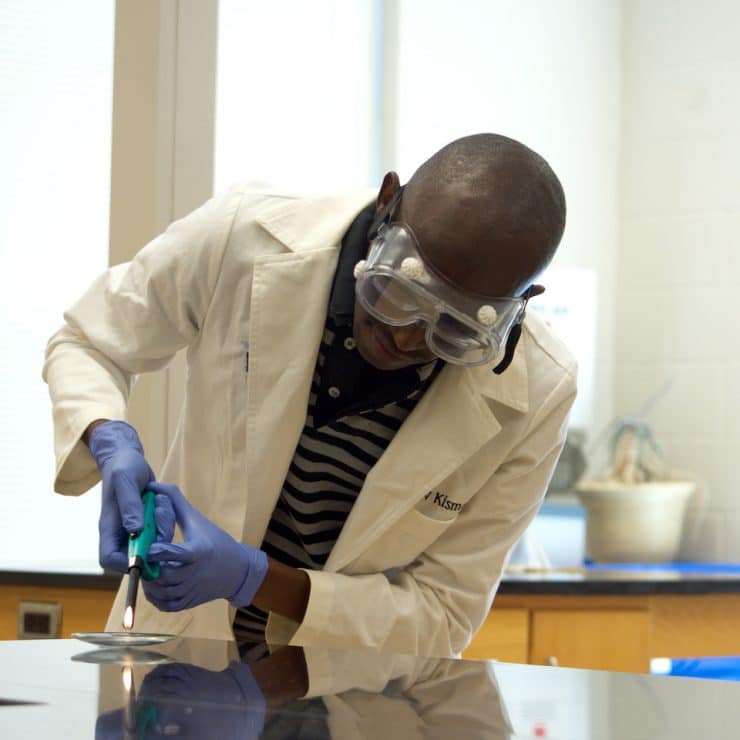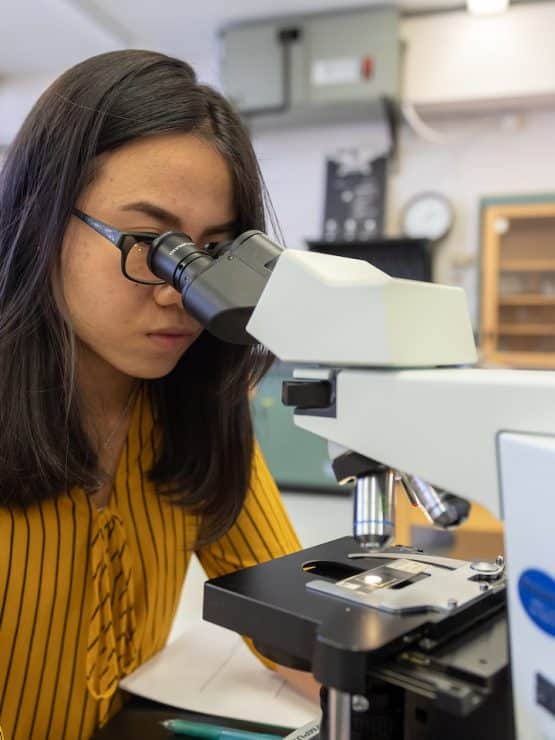
Science
Methodist University’s associate degree in Science will prepare students for a further education in one of the University’s programs within the Natural Sciences Division, such as Biology, Chemistry, Geology, Physics, and more.
A.S. Requirements
The A.S. concentration in Science consists of 31 credits distributed as follows:
| BIO 1530/1531 Fundamentals of Biology I with Lab (4) | MAT 1050 College Algebra (or higher) (3) |
| CHE 1510/1511 General Chemistry I with Lab (4) | PHY 1510 General Physics I (4) |
| CHE 1520/1521 General Chemistry II with Lab (4) | PHY 1520 General Physics II (4) |
| GSC 1600 Physical Geology (4) |
Electives: Select 4 credits of courses with the following prefixes: BIO, CHE, or GSC.
Average Tuition Cost
The average cost for an incoming residential freshman to attend MU is less than $18,000 – similar to the cost of attending one of the big-box public schools, but with the enhanced value of a highly-regarded private school with a 12:1 student-to-faculty ratio.
While tuition varies, depending on a student’s financial aid package, it’s important to know that the average financial award for an incoming residential freshman at MU is more than $34,000.
Financial Aid & Scholarships
More than 97% of MU students receive some form of financial aid, with the University offering more than $24 million annually to students for scholarships. If a student is active military, family of active military, or a veteran, they may also qualify for MU’s military education benefits.
Interested in Methodist University’s Science program?
If you have questions, reach out to Dr. John Dembosky using the contact info at the bottom of the page. If you’re ready to apply today, click the button below!
Science Courses
General Education/Core Requirements: Students will not receive general education/core credits for both SCI 1410 and GLY 1600; SCI 1420 and BIO 1530 and 1531; SCI 1430 and CHE 1510 and 1511; or SCI 1430 and PHY 1510.
SCI 1410 EARTH SCIENCE 3 credits
A survey course for non-science majors. The primary concepts in the geosciences are introduced, including geology, hydrogeology, oceanography, and meteorology. The course emphasizes the relationships among the geosciences as Earth systems. This course includes 150 minutes of lecture and 90 minutes of laboratory each week in a 16-week semester. (Not to be used for the Middle Grades Science concentration. GLY 1600 is recommended for any environmental or science program.)
Corequisite: MAT 1050 or higher
Offered: fall and spring
SCI 1420 BIOLOGICAL SCIENCE 3 credits
Major concepts of biology, including cellular structure, diversity of form, interrelationships among living organisms, and the importance of other organisms to man. 150 minutes of lecture and 90 minutes of laboratory each week.
Offered: fall and spring
SCI 1430 PHYSICAL SCIENCE 3 credits
Basic topics of physics and chemistry with special emphasis on real world applications. 150 minutes of lecture and 90 minutes of laboratory each week. Prerequisite: MAT 1050 or higher Offered: fall and spring
Contact
Stephanie Hooper Marosek, Ph.D.

